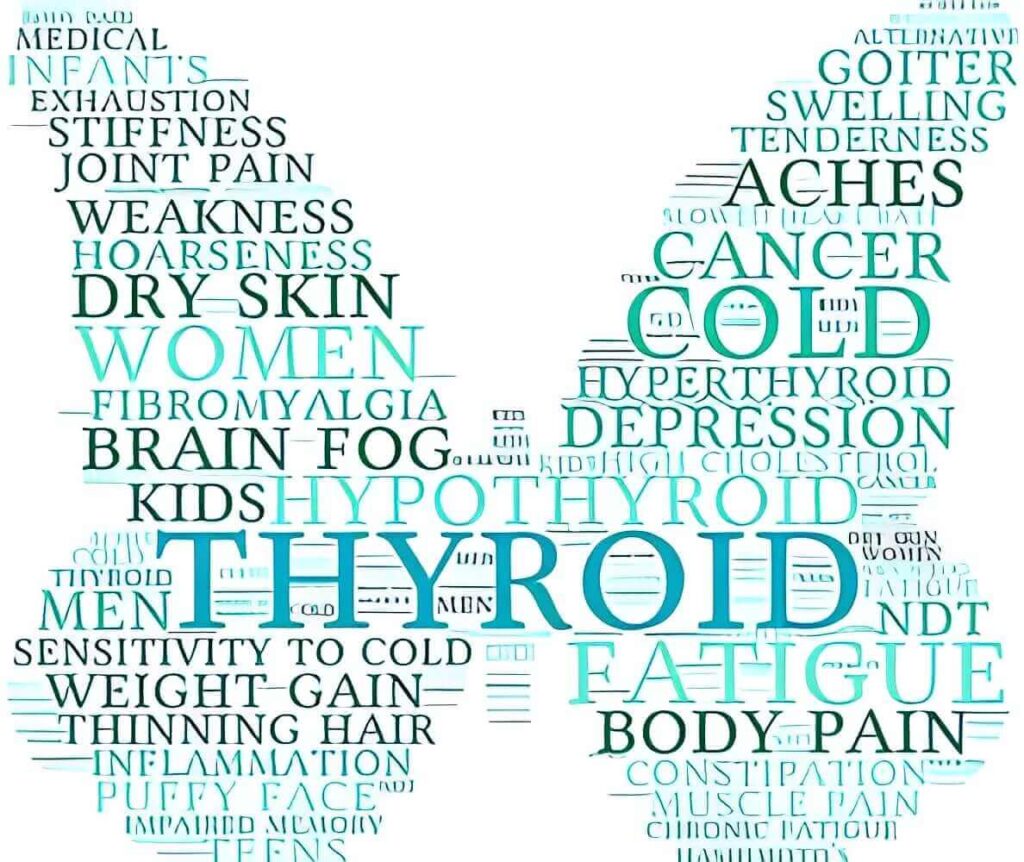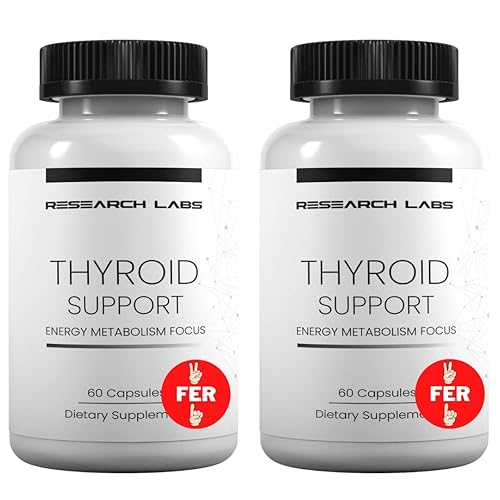🩺 THYROID Awareness Month ORIGIN & HISTORY
Originating from a growing recognition of the importance of thyroid health and the prevalence of thyroid disorders in the population, THYROID Awareness Month raises awareness about thyroid disorders and promotes early detection and treatment. And it’s observed in the Month of January each year.
The American Association of Clinical Endocrinologists (AACE) and the American Thyroid Association (ATA) are two prominent organizations involved in thyroid health awareness initiatives. These organizations have advocated for thyroid awareness and education throughout the year. This includes designating specific months or weeks for heightened focus on thyroid health and helping to prevent, treat, and cure thyroid illness, disease, and cancer.
Possible ORIGINS
Although the precise birth of THYROID Awareness Month is somewhat unclear, here’s what we’ve gathered so far regarding its origin story & history.
THYROID Awareness Month is typically observed in January each year. January was likely chosen for several reasons, including its positioning at the beginning of the calendar year, which provides an opportunity to kickstart health-related resolutions and initiatives. Additionally, January’s timing allows for awareness efforts to coincide with the post-holiday period when individuals may be more receptive to health-related messages and activities.
This month’s establishment likely evolved from various efforts by healthcare professionals, patient advocacy groups, and government agencies.
Get involved with your DOCTOR
The purpose of this article is to raise awareness about thyroid health. It’s essential to prioritize your health and maintain open communication with your doctor. While physicians are often busy, they must remain receptive to discussing your healthcare needs, whether through conventional treatments or preventative measures.
If you feel that your doctor is not listening to your concerns and solely relying on symptoms and blood tests for treatment, they may not be addressing underlying causes or considering lifestyle changes that could benefit you. It’s important to advocate for yourself and work collaboratively with your doctor to make informed decisions about your health.
FACTORS to consider
Doctors strive to provide the best care within the frameworks they have. However, it’s important to acknowledge that all our nations face health challenges. Some stem from depleted soil nutrients, especially iodine crucial for thyroid function. Additionally, our food supply often contains pesticides, and excessive fluoride intake can impact thyroid health.
Maintaining proper hydration with 6 to 8 glasses of water daily is essential for thyroid health. While medication is crucial when preventative measures aren’t sufficient to address health or thyroid issues, it’s also important to consider how certain foods can both positively and negatively interact with thyroid function.
Be PROACTIVE
Both Chinese and Ayurvedic ancient medical practices adopt a holistic approach to thyroid healing. These traditions emphasize the importance of holistic wellness through both medicinal treatments and preventive actions. Prioritizing essential aspects such as sleep, nutrition, stress management, and exercise is crucial for optimizing personal well-being, and it falls under our responsibility. It’s important to allocate time efficiently to fulfill responsibilities and maintain a home environment that serves as a sanctuary. Additionally, avoiding negative relationships that don’t nourish the mind, body, and spirit is essential for overall well-being.
Take proactive steps to care for your body, including your thyroid, and prioritize all aspects of wellness. This encompasses nutrition, physical activity, emotional well-being, and cultivating meaningful relationships through activities like meditation, prayer, and building friendships. Adequate sleep, finding joy in recreation, and enjoying hobbies are also vital components
Setting aside time for pleasure, such as traveling or engaging in activities that bring joy, contributes to a balanced life. Working towards these goals supports overall health, regulates hormonal function, and aids in maintaining proper thyroid regulation.
Consider Thyroid HEALTH
Individuals have the right to choose the best care that aligns with their preferences, though natural and preventive care often appear favorable. Additionally, numerous medical research institutions provide valuable insights and resources on thyroid health.
Conventional medical care holds significance due to the vital role the thyroid plays in bodily functions. It’s crucial to heed professional medical advice consistently. Approximately 1 in 10 individuals in the United States, totaling around 20 million people, experience some form of thyroid-related issue. Many people with thyroid problems may not even realize they have one, with an estimated 60% being unaware. January serves THYROID Awareness Month as an opportune time for individuals to undergo screening for thyroid health.
Know the WARNING signs
Understanding certain indications of thyroid health and gaining knowledge about its function in regulating essential body processes is crucial. Educate yourself about the warning signs of thyroid issues and the various screening methods available for diagnosing thyroid conditions. Have open discussions with your doctor about all your health concerns, including those related to your thyroid.
A wealth of information exists about thyroid conditions, along with numerous resources to help you make informed decisions for yourself or loved ones affected by thyroid disorders. Remember, there is hope, and you are not alone in your journey. Keep in mind that both conventional medicine and natural approaches can work collaboratively to address thyroid concerns and illnesses – it’s your choice to determine which is the best personal approach.

Throughout THYROID Awareness Month, various activities and events are organized to raise awareness about thyroid disorders, promote education, and encourage individuals to take proactive steps toward thyroid health. These activities may include public awareness campaigns, educational seminars, health fairs, screenings, fundraising events, and social media initiatives.
Over the years, THYROID Awareness Month has grown in visibility and impact, thanks to the efforts of healthcare professionals, patient advocates, thyroid organizations, and individuals affected by thyroid disorders. By raising awareness, promoting education, and advocating for improved access to thyroid care and support services, THYROID Awareness Month continues to play a crucial role in improving the lives of those affected by thyroid conditions.
💡 HOW to Celebrate & Observe THYROID Awareness Month?
Not sure how to LOVE the month? We’ve got a few interesting ideas to consider that may help get you started.
Here are some activities that you can do during THYROID Awareness Month!
💙 Get SCREENED
Learn about your own thyroid and the function it has within the body. Encourage friends and family members to schedule thyroid screenings, especially if they have risk factors or symptoms of thyroid disorders. Hypothyroid & hyperthyroid are the most common. Scheduling appointments with healthcare providers to discuss thyroid health and asking questions ensures you’re receiving appropriate care and monitoring.
💙 Wear the COLORS
Show your support by wearing blue, pink, and teal clothing or accessories throughout the month to raise awareness of thyroid health.
💙 Practice SELF-CARE
Take time to prioritize your own thyroid health by eating a balanced diet, getting regular exercise, managing stress, and getting enough sleep.
💙 Start CONVERSATIONS
Become knowledgeable about thyroid health and get friends and family involved with the learning curve. Then initiate conversations about thyroid health with them along with coworkers. Raise awareness and reduce stigma surrounding thyroid disorders.
Actions you take now put you at risk for thyroid disease later. Be proactive at knowing what these risks are. Know your family history, radiation/fluoride exposure, and certain medications or foods.
💙 Celebrate Thyroid SURVIVORS
Highlight stories of individuals who’ve overcome thyroid disorders or are thriving despite their condition to inspire others and celebrate their resilience.
💙 FUNDRAISE
Many neighborhoods get involved in THYROID Awareness Month. Join or organize a thyroid-themed walk, talk, or run to raise funds and awareness to support thyroid research, advocacy organizations, or patient support groups. Find out what’s going on in your area, get involved, and ask friends and family to join you … or just donate!
💙 RAISE Social Awareness
Use social media posts with the hashtags #ThyroidAwarenessMonth, #ThyroidAwareness, #Thyroid, #HealthHolidays, #JanuaryHolidays, #Holiday, #FindADayToLOVE, #iHEARTdays to support the importance of celebrating, promoting, and sharing with the world why you ❤️ THYROID Awareness Month.
LEARN more about the importance of THYROID HEALTH
THYROID ISSUES COULD CREATE SERIOUS HEALTH PROBLEMS
A NATURAL APPROACH TO THYROID HEALTH
NINE Important Facts you never knew about THYROID Awareness Month
- The shape of the thyroid gland often resembles a butterfly, with two lobes connected by a narrow isthmus in the middle.
- Thyroid disorders affect millions worldwide, with women being more susceptible than men.
- Iodine plays a crucial role in thyroid health. An iodine deficiency can affect thyroid hormone production.
- Thyroid dysfunction can affect many bodily functions like metabolism, energy levels, body temperature, heart rate, and more.
- Lumps within the thyroid gland (nodules) are prevalent, especially as people age.
- Thyroid imbalances can impact fertility and pregnancy in both men and women. Thyroid hormones are crucial during pregnancy as they play a vital role in the development of the baby’s brain and nervous system.
- Many thyroid disorders can be managed with medication, lifestyle changes, and sometimes surgical intervention.
- Thyroid cancer has a high survival rate, especially when detected early and treated promptly.
- Thyroid awareness leads to early detection and better outcomes.
Famous PEOPLE also born during the Month of February
-
Martin King (Martin Luther King Jr)
American civil rights leader and minister best known for his nonviolent activism, leadership, and “I Have a Dream” speech during the American civil rights movement. His father changed both their names when he was just five years old. Born 1929.
MARTIN LUTHER KING JR Quote
“In the end, we will remember not the words of our enemies, but the silence of our friends.”
-
Elvis Aaron Presley
American singer and actor, often referred to as the undisputed “King of Rock and Roll”, whose influence on music and culture is still felt today. Born 1935.
ELVIS Quote
“Truth is like the sun. You can shut it out for a time, but it ain’t goin’ away.”
-
David Robert Jones (David Bowie)
British musician, singer, and actor known for his innovative music, fashion, and persona, influencing generations of artists and performers. Born 1947.
DAVID BOWIE Quote
“I don’t know where I’m going from here, but I promise it won’t be boring.”
Future DATES for THYROID Awareness Month
| Year | Date | Month of the Year |
|---|---|---|
| 2024 | January 1 | January |
| 2025 | January 1 | January |
| 2026 | January 1 | January |
| 2027 | January 1 | January |
| 2028 | January 1 | January |
🎗️ Thyroid FAQ
WHEN is THYROID Awareness Month?
- THYROID Awareness Month is an annual celebration held in January each year.
Who’s at RISK for Thyroid disorders?
- Thyroid disorders can affect anyone, but certain factors may increase the risk, including family history of thyroid disease, autoimmune conditions, iodine deficiency, radiation exposure, and age (women over 60 are at higher risk).
What are the most COMMON Thyroid disorders?
- There are several types of thyroid diseases, each with its own characteristics and effects on thyroid function. Typical thyroid maladies are hyper (overactive) and hypo (underactive). Here is a breakdown of the most common types:
- Hypothyroidism – This condition occurs when the thyroid gland doesn’t produce enough thyroid hormone. Symptoms can include: fatigue, sluggishness, weight gain, and cold sensitivity. Hypo may create a decrease in sweating and the skin may become dry and thick. The hair may also become coarse, eyebrows sparse, and nails brittle.
- Hyperthyroidism – In contrast to hypo, hyperthyroidism is characterized by an overactive thyroid gland that produces too much thyroid hormone. Symptoms can include: weight loss (despite a normal or increased appetite), anxiety, rapid heartbeat, heat intolerance, tremors, frequency of bowel movements, and shortness of breath. A goiter is commonly found upon physical examination.
- Thyroiditis – This refers to inflammation of the thyroid gland, which can be caused by various factors including infection, autoimmune conditions, or certain medications.
- Hashimoto’s disease – An autoimmune disorder where the immune system attacks the thyroid gland, leading to inflammation, reducing its ability to make hormones, and the eventual destruction of the gland.
- Graves’ disease – Another autoimmune disorder where the immune system stimulates the thyroid gland to produce excessive thyroid hormone, resulting in hyperthyroidism.
- Thyroid cancer – Although less common than other thyroid disorders, thyroid cancer occurs when abnormal cells within the thyroid gland multiply uncontrollably.
- Thyroid nodules – These are lumps or growths that develop within the thyroid gland. While most nodules are benign, some can be cancerous.
- Goiter – An enlargement of the thyroid gland, often caused by iodine deficiency, autoimmune disorders, or thyroid nodules. It can lead to symptoms like neck swelling, difficulty swallowing or breathing.
The Imp💜rtance of THYROID Awareness Month
THYROID Awareness Month encourages people to learn about thyroid health, recognize potential symptoms, and seek medical attention if necessary, ultimately leading to better outcomes for individuals with thyroid disorders.
The thyroid’s optimal functioning relies on a balanced hormonal supply. Essential nutrients like iodine, selenium, zinc, and vitamin D play a crucial role in thyroid nutrition. As a gland with multifaceted responsibilities in the body, understanding and monitoring thyroid health is vital for overall well-being. THYROID Awareness Month serves as a reminder of this importance. Take care and prioritize your health!
-
Critical FUNCTIONS
This small but vital gland in your body plays a significant role in regulating bodily functions, and understanding it is crucial. This gland produces hormones essential for maintaining your metabolic rate, supporting growth and development. Proper thyroid care ensures optimal control over heart, muscle, and digestive functions, as well as brain development and bone health.
-
Educating PERSONAL Health
January resonates with many because it addresses a vital aspect of personal health. So understanding its function and potential disorders is empowering. For individuals affected or those with loved ones who are, THYROID Awareness Month provides a platform for education. Learning about symptoms, treatment options, and lifestyle management strategies can improve quality of life and foster a sense of control over one’s health.
-
Advocating AWARENESS
By shining a spotlight on thyroid health, THYROID Awareness Month catalyzes advocacy efforts. It encourages discussions with healthcare providers, promotes funding for research, and advocates for policies that improve access to thyroid care and support services.








